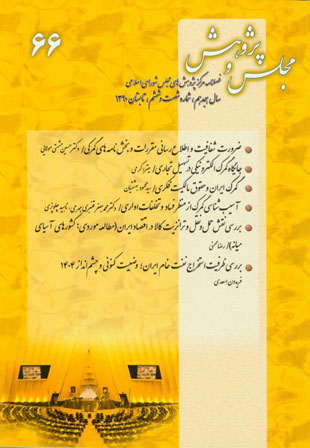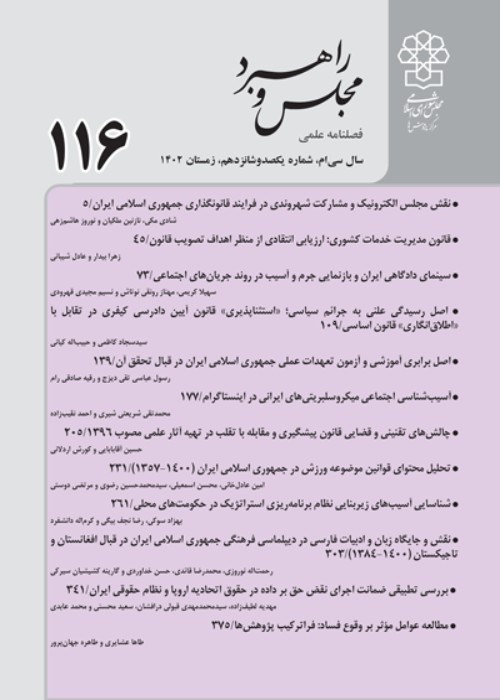فهرست مطالب

فصلنامه مجلس و راهبرد
پیاپی 66 (تابستان 1390)
- 182 صفحه، بهای روی جلد: 15,000ريال
- تاریخ انتشار: 1390/09/20
- تعداد عناوین: 7
-
صفحه 5
-
صفحه 63
-
بررسی نقش حمل و نقل و ترانزیت کالا در اقتصاد ایران / مطالعه موردی: کشوره ای آسیای میانهصفحه 109
-
Page 7Given the relations between World Trade Organization and World Customs Organization (WCO), transparency and information on customs regulations and circulars can play a decisive role to attract domestic and foreign businessmen. Therefore, customs organizations are charged with the simplification and elimination of the complex and traditional rules and regulations governing business process as well as with the replacement of electronic systems and the abandonment of traditional and manual methods, they prepare a good way for information and the reduction of corruption and bureaucratic bottlenecks. In this paper, a questionnaire is designed by using survey research method and based on "accessibility to customs information" and also "ability to communicate information" indicators and completed and evaluated by answering a number of businessmen who have so dealt with customs in the fourth development plan Act. According to the study, what can be effective in this process and help to increase customs productivity should be followed more by two aspects: one aspect is internal developments of customs organizations that includes qualitative improvement of human resources, information technology changes (for example, the ratio of electronic to manual operations), the simplification of customs procedures and formalities, and reducing the time between customs legislation, receiving and its enforcement in customs centers, and the amendment of rules and regulations too. Another aspect that we call external developments is outsourcing many operations that the speed and quality of information and transparency of regulations and circulars can be improved by the private sector participation.
-
Page 31Today, new technologies have caused significant changes in various areas. E-commerce and ICT applications in the exchange of goods and services areas have caused trade facilitation that it reduces the cost and time of business processes to be performed. Trade facilitation is simplification of business processes and international trade procedures and the assimilation of information and government agencies. In fact, electronic customs is one of the new technologies achievements in customs. E-customs causes the transparency of customs matters, to facilitate exports and imports of goods and services and ultimately, leads to improve the competitive position of countries in the field of international trade with electronic daily processes. Also realizing the importance of the implementation of electronic customs, the Islamic Republic of Iran Customs Administration has taken measures to implement electronic customs as a customs development plan by using international experiences. In this paper at first, concepts such as business development strategy, trade facilitation, and electronic customs are studied and experiences of leading two countries in electronic customs are mentioned. Then, analyzing the role of electronic customs in trade facilitation, measures taken to implement electronic customs are explained and challenges of the issue are enumerated. Finally, proposals to enhance the status of electronic customs and a greater role in its business activities are presented.
-
Page 63Supporting innovations and intellectual creativities owners that called"Intellectual Property Rights" as a necessity in the fields of technology and art began 140 years ago and with industry and business development, the more its types and forms and the more risks of violating the rights so now in addition to civil laws of countries, an international organization called "WIPD (World Intellectual Property Database-subset of the United Nations) has been created which have 24 International Convention Coverage and an important international agreements within the WTO called TRIPS (Trade-Related aspects of International Property Rights) to explain the cases and forms and to combat violations or violators of these rights. The paper is a descriptive study and has been written based on narrative review and visiting the WCO, WIPO, WTO, INTERPOL sites and according to Customs Act (enacted 1971), and personal experiences during service in Customs Department, issues have been gathered and with the intention of demonstrating the scope of the issue with various aspects and its explanation, the outline for training and complementary studies, conclusion and recommendations for adding Articles to the Customs Act has been presented. This study shows that although our country approved "Registered Trademarks and Patents Act" to support intellectual property rights in 1931 and ratified "Copyright Act" in 1970 and in addition, acceded to "Paris Convention" in December 1959 and "WIPO Convention" in March 2002. but actually this dangerous phenomenon has been neglected especially by "Customs Act" regarding the violation of these rights when crossing goods from borders and customs, necessary actions should be taken and therefore regardless the nature of the relevant conventions, recommendations on adding some Articles to Customs Act (mostly borrowed from WCO Model) have been taken procedurally.
-
Page 83All countries are involved with the bureaucratic corruption more or less and with the philosophical basis from the attitude of the most material to the most divine, governments always claim to fight corruption seriously that it prepares the way for strengthening their own legitimacy. Both moral and spiritual corruptions destroy the society but bureaucratic corruption reduces the public trust in the system and it can impact greatly on community development. On the contrary, bureaucratic health is adherence to accepted norms and values in every culture, organization, and society. Common corruption in all fields is the violation of ethical and legal norms in organizational and job performances. Bureaucratic corruption is complicated, obscure, and diverse. Therefore, it must be prolonged and complicated to fight it. It is notably to fight corruption that corruption can not be destroyed but it can be reduced. Meanwhile, customs name has been often mentioned by government institutions that their bureaucratic corruption is widespread. Given the customs plays a vital role in revenue, trade facilitation, national security, and the protection of society, corruption in customs can cause severe economic constraints and limited social prospects and ideal goals for national development. Today, bureaucratic corruption has become more complex and occurred systematically. Therefore, in order to effectively fight corruption in customs, a comprehensive and sustainable approach to addressing its underlying causes and consequences is essential. Pragmatic approach which complies with the conditions is required to deal with it rapidly and practical experiences of efforts to combat bureaucratic corruption must also be relying on comprehensive, organized, and continuous solutions. Using information technology (IT) and computerized government agencies in the form of e-government as well as transparent decision making processes and decision-making will be basic strategies for fighting bureaucratic corruption. With the corruption definition and explanation of bureaucratic corruption and the importance of bureaucratic health in WCO, the elimination of corruption and the promotion of bureaucratic health in customs strategies will be discussed in this paper.
-
Page 109According to the geography of Iran's neighboring countries, especially Central Asia, use of transit opportunities can play an important role in regional trade and income for the Iranian economy that is largely dependant on oil revenues. Accordingly, the paper studies the role of transport and transit of goods in Iran economy also corridors and opportunities for transit from the border with Iran.
-
Page 147According to the twenty-year perspective document to 1404, Iran situation has been seen so that its economy should be ranked the first in regional countries. To achieve this goal- due to the large part of public funding sources and needs of the country's currency are provided by oil revenues- has direct relation with how to produce oil in Iran. In the beginning of the paper, the author's impression precedes that in order to be ranked the first in oil crude production; the main problem is only investment and attraction of foreign investment. But with detailed consideration, this point became clear that the current major and active oil fields and reservoirs in the country are unable to achieve the goal through gas injection compared with Saudi Arabia and some other regional countries with oil resources and reserves. Accordingly and given the long-term planning in Iraq to increase crude oil production, the fall of Iran's current ranking in crude oil production is likely.


